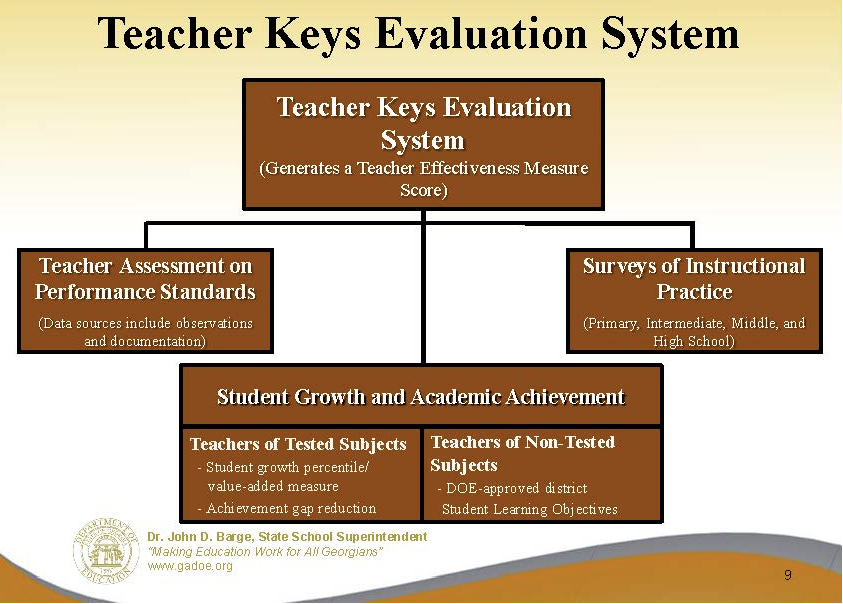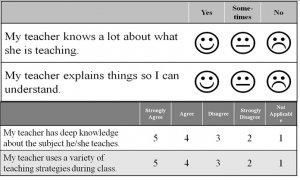Georgia Department of Education Says Evaluation Plan Won’t Work But Will Implement it Anyway?
Latest Story
The Georgia Department of Education claims that the evaluation system they developed along Federal guidelines needs to be modified. They think one part will not work because it will put the state at risk from lawsuits by teachers.
When I first saw the headline in the Atlanta Journal Constitution newspaper, I thought that maybe the state officials got the message written by more than 30 professors. The message, in the form of a letter sent to Georgia officials including the governor and state school superintendent, challenges the teacher and leader evaluation system, identifies the unintended negative consequences, and recommends the state opt out of this invalidated and unreliable system.
My excitement quickly faded when it turns out that the state wants to cut one very insignificant part of the teacher assessment system. They think children in grades K-2 are too young to check the ability of their teachers. So they have requested this part of the assessment be removed, but kept in tact the rest of the system.
Here is what happened.
On July 2nd, the U.S. Department of Education (US ED) wrote to the Governor of Georgia indicating concern about the overall. educator evaluation system.
US ED is concerned that the Georgia Department of Education has made amendments to the Race to the Top (RTT) grant that they received two years ago. Because the State made changes through amendment requests, on site reviews, monthly calls and other conversations, part of Georgia’s Race to the Top grant has been put on “high-risk status” and could cost the state about $33 million from its $500 million RTT grant.
The Atlanta Journal reported that the State Department of Education says the evaluation plan that they have field tested (for about 4 months) won’t work. It won’t work, according to State Department lawyers because it might lead teachers to bring lawsuits against the state.
Letter of response from Georgia Governor Deal and State School Superintendent Barge suggesting that the previous administration had written the RTT grant, and things had changed since then (2009). The State asked for changes in their RTT grant because only because their legal advisors said they might put the state in a highly “litigious situation.”
But Here’s the Deal: The Flawed Teacher Evaluation System Will Still Be Used
The only part of the very multi-pronged teacher (and leader, meaning principals) evaluation system that will change is insignificant. The rest of the system to grade teachers and principals will stay. The system has three components that combined to generate a Teacher Effectiveness Measure Score. The three components are shown in the Figure 1 include:
- Teacher Assessment on Performance Standards: Data sources include observations of classroom teachers, and documentation.
- Surveys of Instructional Practice: Student opinions of their teachers. All grades, except K-2.
- Student Growth and Academic Achievement: If you are a teacher of a tested subject (math, reading/LA, science, social studies) the state will use student growth percentile and value-added measure, and achievement gap reduction. If you are teachers of a non-tested subject it’s even worse, but your effectiveness will be judged based on some district wide average. This has not been accomplished.

Figure 1: Georgia Teacher Evaluation System consisting of three components with contribute to an overall Teacher Effectiveness Measure (TEM)
If you are a teacher in Georgia, your job performance will be determined by the combination of the three components described above, and seen in Figure 1. We still do not know how much each part will contribute to your final score. Waiting.
The first component, Teacher Assessment on Performance Standards means administrators will visit your classroom several times during the year to check your teaching performance. They will use a scoring rubric (observation form) to judge how well you are doing on five standards, and ten performances (see Figure 2).

Figure 2. Performance appraisal rubric example. The state will use these qualitative rubrics to measure teacher performance.
For example, your principal comes in and announces she is going to use the State’s appraisal rubric to check your performance. She tells you she can only stay for 30 minutes (yet you have a 90 minute period). Using the (Class Keys Teacher Evaluation System) rubric, that hopefully she was trained to use, and has a high inter-rater reliability score, she sits on the side of your classroom, and watches you teach. Either during the visit, or after, she checks off how you did based on a Performance Appraisal Rubric. You can be graded Exemplary, Proficient, Developing/Need Improvement, or Ineffective (Figure 2). The 10 standards are assessed using a list of 26 Class Keys, each of which has a specific rubric. There is an inverse relationship between the nature of these behaviors, and the test-based mania that controls the way teachers teach, and the curriculum that is implemented. Observation protocols such as these depend on the observer being trained, and having a high inter-rater reliability score.
The system of observations also puts enormous time constraints on principals, especially if they have large faculties. How would it be possible for a principal to visit every teacher in her school one or more times per year, conference with the teacher, and complete the paperwork that will burden any effective administrator. And, bringing in outside observers also raises questions about reliability. One also has to wonder how a person can simply drop in at the middle of a course, let alone a lesson, to understand the context of the lesson. The system is fraught with problems.

Figure 3: Survey of student opinions. The State of Georgia does not want to use this system with students in grades K – 2. Legal issue.
In the second component, surveys ask students to report on items that they have directly experienced. This is the part for grades K – 2, that the state asked for a modification from the US ED. Essentially this component surveys students to evaluate their teachers. One example of a survey question is: My Teacher knows a lot about what she is teaching (yes, sometimes, no). Or my teacher has deep knowledge about the subject he/she teaches: Strongly agree, agree, disagree, strongly disagree, not applicable. Figure 3 shows survey question examples from K-2 and from high school.
The third component will use student achievement test scores (high-stakes, end-of-the-year) to show a percentile/value-added measure (VAM). On the state website, it says: “The model will be developed soon.” The problem is the state will never find or develop a model that will produce stable ratings of teachers. In studies where VAMs have been used, the results were unreliable in establishing how much a teacher contributed to student learning.
But more than that, the entire system is tired and old, and pushes us further backward instead of embracing an entirely different generation of students whose world outside of school is native to them. When they come to school, they are more like immigrants entering a world foreign to them.
So, it is not so that the state thinks their teacher and leader evaluation plan won’t work. The Georgia State Department intends to implement the Georgia Teacher Evaluation system in at least 29 school districts starting in August. According to a group of 30 Georgia professors of research, there will not be enough time for the state to effectively check the four-month field test of the system which they implemented during the Spring of 2012.
The education establishment is out of touch with youth in trying to impose a rigid, linear model of teaching and learning, and holding teachers, who are caught in the middle, hostage to an unproven and inept system of standards and evaluation.
In the introduction to their book Rewired: Understanding the iGeneration and the Way They Learn, the authors point out the disconnect between the lives of students in and out of school.
Despite the revolutions wrought by technology in medicine, engineering, communication, and many other fields, the classrooms, textbooks, and lectures of today are little different than those of our parents. Yet today’s students use computers, mobile telephones, and other portable technical devices regularly for almost every form of communication except learning. —National Science Foundation Task Force on Cyberlearning (Rosen Ph.D., Larry D. (2010-08-03). Rewired: Understanding the iGeneration and the Way They Learn (p. 1). Macmillan. Kindle Edition.
The teacher and leader evaluation system, as initially proposed in Georgia’s Race to the Top grant has only been tweaked, not substantially modified. The system as it stands now will be put into practice will provide inaccurate assessments of teachers, and will result in the degradation of the morale of teachers and administrators who are ethical professionals trying to carry out standards they did not choose, yet know they are responsible for implementing them in their classrooms.
That said, we should heed the insight of Georgia research professors who have challenged the teacher and leader evaluation system, and identified the unintended negative consequences and recommends the state opt out of this invalidated and unreliable system. In their words,
We all cannot afford to lose sight of what matters the most—the academic, social, and emotional growth and well-being of Georgia’s children. Our students, teachers, and communities deserve better. They deserve thoughtful, reliable, valid reforms that will improve teaching and learning for all students. It is in this spirit that we write this letter.
What are your opinions of teacher evaluation systems that rely on student achievement scores, observations by administrators and student surveys?
This blog post has been shared by permission from the author.
Readers wishing to comment on the content are encouraged to do so via the link to the original post.
Find the original post here:
The views expressed by the blogger are not necessarily those of NEPC.
